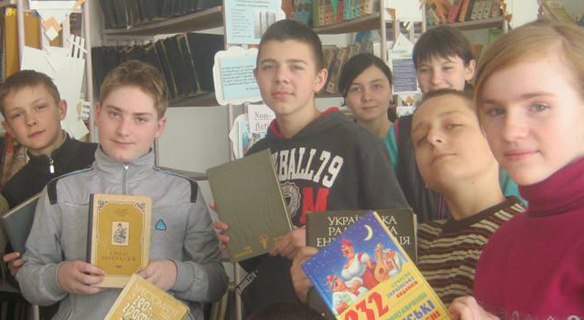Тема: I need a book
Підтема: At the library
Мета:
вміти здобувати інформацію з текстів, з роздатковим матеріалом, активізувати вживання лексичних одиниць теми в усному мовленні учнів, практикувати учнів у зв’язних монологічних та діалогічних висловлюваннях, навчати дітей працювати в парах та групах; закріпити правила вживання спонукальних речень у непрямій мові;
розвивати навички аудіювання, розвивати пам'ять, логічне мислення в процесі виконання навчальних завдань;
розширювати світогляд учнів, викликати інтерес до читання;
виховувати зацікавленість у розширенні своїх знань, виховувати культуру спілкування, заохочувати до вивчення нового.
Тип уроку: комбінований.
Обладнання: загадка (НО1), текст для аудіювання «At the Library»(НО2), картки для індивідуальної роботи(НО3),картки з завданням для групової роботи(НО4), картки для самостійної роботи(HO5),текст для читання «Libraries»(HO5), малюнки (фото бібліотек).
Procedure.
I. Greeting.
Teacher: How are you today? How do you feel? Give your reasons.
Pupil 1: 1 feel happy. The weather is fine today. And you?
Pupil 2: 1 am fine. I'm with my friend. And you?
Pupil 3: 1 feel energetic.
Teacher: I'm proud of you. I'm happy that I have such good students and I'm sure our lesson will be successful and our work will be productive.
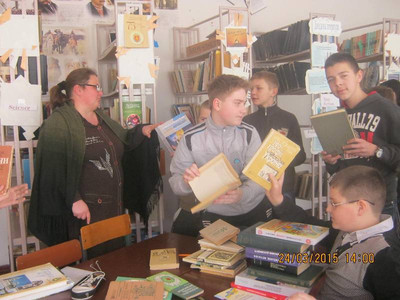
II. Introduction
Teacher: Now read the riddles and guess the theme of our lesson.
The field is white,
Black is the seed,
The man who sows it,
Is clever indeed.
Pupil: These friends are books.
Teacher: Right you are. A book is a main source of knowledge. It is impossible to imagine our life without books. They play an important role in educating, upbringing and help us to get useful information. Where can we get books?
Pupil 1: In the bookstores.
Pupil 2: At the markets.
Pupil 3: In the libraries.
Teacher: So the theme of our lesson is "At the school library". At the lesson we are going to revise the words learned earlier, to improve your reading, listening and speaking skills.
III. Main part.
1. Speaking Discuss questions:
- Do you like reading books? What kind of books do you read most often?
- Do you have a favourite writer? Who is he/she?
- Do you have many books at home? Have you read all of them? What is the most useful book in your home library?
- What books should be kept in every home?
- Do you ever borrow books from the libraries? What libraries are they? What kinds of books do you usually take?
- Do you know what an e-book is? What is an audiobook? Do you think people will read paper books in the future? Will there be libraries in the future?
2. Listening
2.1. Pre–listening activity.
Do you go to the libraries?
Why do we need libraries?
When did you go to the library for the last time?
You’ll listen to about libraries. Be very attentive. After listening you’ll have to do the task.
2.2. Listening
Listen to the text “At the Library”
We like reading. There are a lot of books in our country. But we can’t buy all the books which we like, that’s why we go to the library. Libraries are very important in the life of people.
It is the library. You can go there if you want to take out a book and read it at home or if you want to read the books at the library.
What is the library? It is a big, light room. There are many bookcases and bookshelves with a lot of books on them.
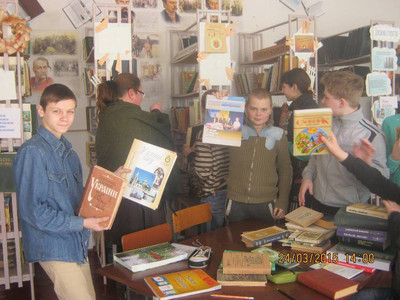
You can see novels, poems, plays, books on history, geography, and arts at the library. Adventure books are very popular. You can see a reading room on the right with many tables and chairs where you can read books, newspapers, and magazines. You can find millions of books by the greatest writers and poets well-known all over the world.
Pupils go to the library to read books, to look through some new magazines and to prepare for their reports. The librarian helps the pupils to find the books they need. Many teachers go to the school library, too. Sometimes the teachers prepare for the lessons at the school library.
I think it is difficult to live without libraries.
2.3. Post-listening activity
I. Choose the right variant
1. There are a lot of … in our country.
a) magazines
b) books
c) films
2. We go to the library …
a) because we can not buy all books which we need
b) to look through the magazines
c) to spend our free time.
3. You can go to the library if you want …
a) to take out a book
b) to buy a book
c) to meet your friends
4. The library is…
a) a big clean room
b) a small light room
c) a big light room.
5. …. are very popular.
a) Historical novels
b) Adventure books
c) Fairy tales
6. You can see a reading room with…
a) many tables and chairs
b) 3 tables and chairs
c) many computers
7. Pupils go to the library…
a) to spend their free time
b) to read books, to look through magazines
c) to watch films
8. Sometimes the teachers…at the school library.
a) prepare reports
b) spend their free time
c) prepare for the lessons
II. Find true and false statements
1. You can go to the library if you want to buy a book. (F)
2. Pupils go to the libraries to spend their free time. (F)
3. Adventure books are not very popular. (F)
4. Sometimes the teachers prepare for the lessons at the school library. (T)
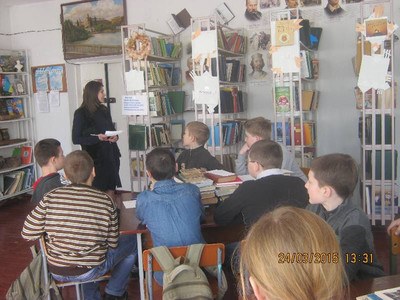
3. Work in groups
Group 1.
Match the words with their definitions
a) is a place where you can read books and newspapers
b) is a story of love, adventure, mystery with happier events than those of real life
c)is a person who works with books in the library
d) is a place where you can borrow books
e) are the books written for adults
1. a library
2. a librarian
3. a reading room
4. a teenagers romance
5. grown – up books
Group2
Imagine you are in the library now. You are librarians and readers. Do your tasks.
Match the phrases to get a conversation at the library and then act out the dialogue.
1. Hello! We've just moved into this district and I'd like to borrow books from your library. a. Please fill in this form. Write your name and address.
2. No, not yet. b. ten days. If you need some books for a longer period you can renew them. You can do it to by telephone. You needn't specially come to the library for that.
3. How many books can I borrow at a time? с Three fiction books and four non-fiction.
4. How long can I keep the book? d. Good. Have you got a library card?
5. Thank you. Do you have any books on the American Civil War? I am interested in that period of American history. e. Look through the catalogues. Our library is rich and Г sure you'll find the books you need.
6. Thank you.
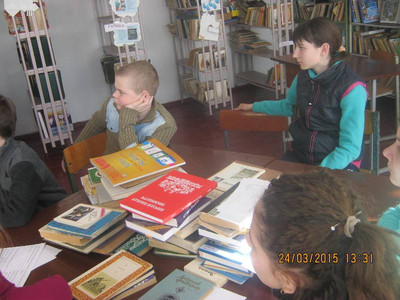
Group 3.
Put the books on the right shelves in alphabetical order. Make an alphabetical list of titles for each shelf: Non-fiction, Fiction, Reference.
The History of Art, Flowers of Great Britain, Short Stories, J.K.Rowling Harry Porter, Money, Oxford Student's Dictionary of Current English, Children's Pictorial Dictionary, P.L. Travers Marry Poppins, A History of Britain, Phrasal Verbs, Encyclopedia, Mars as We Know It, Journey through Africa, Maps of the World, Lewis Carroll Alice in Wonderland, Picasso's Life, Charles Dickens Oliver Twist, Ancient Greece, World Atlas, Dictionary of Synonyms.
Group 4.
Think of and write some Library Rules for our school library.
- Don't make noise in the library. Speak quietly.
- Don't write anything on the pages with a pen or a pencil.
- Don't tear the pages.
- Don't lose the books - it means that you lose your friends.
- Return the books in time.
4. Grammar Practice.
Match the sentences in direct speech with those in reported speech.(HO5)
1) “Can you give me that book, please?”Nelly said a) The woman asked to pass her the bread.
2) “Give me that book, Frank”, Nelly said. b) Nelly asked to give her that book.
3) “Could you pass me the bread, please” c) Tom told Helen to pass him the bread.
4) “Pass me the bread, Helen”, Tom said. d) Nelly told Frank to give her that book.
5. Pair work.
Do you like reading? Make up your own dialogues in pairs.
Pupil 1: Do you like reading?
Pupil 2: Of course, I do.
Pupil 1: What kind of books do you like?
Pupil 2: I like reading historical novels because I am interested in history and books help me to learn more about historical events and famous people. And what books do you prefer?
Pupil 1:I like reading poetry. I am fond of poetry and want to write good poems myself
6. Reading
6.1 Pre – Reading Activities. Answer the questions.
1) Want kind of books can you find at the library?
2) Do you know the origin of the word “Library”?
6.2 While – Reading Activities. Read to the text and say if the libraries are an ancient human invention. Libraries
6.3 Post – Reading Activities. Make up the plan and retell the text
IV. Pupils’ results. Conclusion.
Teacher: What have you learnt about libraries? What kind of books have been spoken about at the lesson? What role do books and libraries play in our life? What are the rules that you should keep to at the library? Hometask.
Write a composition on the topic "A Library is a Great Help".
| 